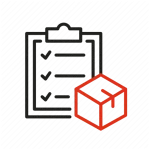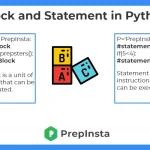Block and Statement in Python
Block and Statement
A Block is a piece of Python program text that is executed as a unit. The following are blocks: a module, a function body, and a class definition. Each command typed interactively is a block. Instructions that a Python interpreter can execute are called Statements.

Block and Statement
Block :
- A Python program is constructed from code blocks.
- A script file (a file given as standard input to the interpreter or specified as a command line argument to the interpreter) is a code block.
Statement :
- There are different types of statements in the Python programming language like Assignment statement, Conditional statement, Looping statements etc.
- P=’PrepInsta’ #assignment statement
- Multi-Line Statements: In Python we can make a statement extend over multiple lines using braces {}, parentheses (), square brackets [], semi-colon (;), and continuation character slash (\).
Example :
- def add(a,b): #Block
- P=’PrepInsta’ #statement

Implementation of Block and Statement in Python
Run
#Block
def add(A,b):
#block
Class Student:
#block
def(self,name,roll):
#block
#Statements
#Continuation Character (\):
s = 1 + 41 + 48 + \
4 + 51 + 6 + \
50 + 10
#parentheses () :
n = (17 * 5 * 4 + 8 )
#square brackets [] :
cars = ['BMW',
'THAR',
'FERARI']
#braces {} :
x = {1 + 2 + 3 + 4 + 5 + 6 +
7 + 8 + 9}
semicolons(;) :
a= 2; b = 3; c = 4Prime Course Trailer
Related Banners
Get PrepInsta Prime & get Access to all 200+ courses offered by PrepInsta in One Subscription
Get over 200+ course One Subscription
Courses like AI/ML, Cloud Computing, Ethical Hacking, C, C++, Java, Python, DSA (All Languages), Competitive Coding (All Languages), TCS, Infosys, Wipro, Amazon, DBMS, SQL and others






Login/Signup to comment